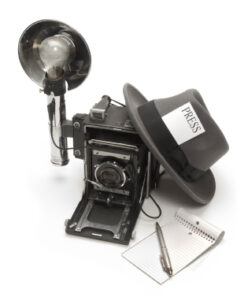Persistent or Pushy? Following Up On Your Pitch
 You sent your press release. Now what? Do you sit and wait, hoping the journalist takes notice? Or do you follow up and risk getting on their nerves in order to gain recognition? To help you make that grand decision, I’ve composed the dos and don’ts of following up:
You sent your press release. Now what? Do you sit and wait, hoping the journalist takes notice? Or do you follow up and risk getting on their nerves in order to gain recognition? To help you make that grand decision, I’ve composed the dos and don’ts of following up:
Do … follow up by phone. If you’ve neve… Read more
10 Tips for Email Etiquette When Dealing with Reporters
 Emailing your pitch to a reporter? Make sure you follow these simple rules of etiquette:
Emailing your pitch to a reporter? Make sure you follow these simple rules of etiquette:
- Quit with the caps in the subject line. Trying to show excitement in the subject line? Let me assure you that using all caps is not the way to do it. Let’s forget the whole idea that caps are considered yelling in the
5 Reasons You Should Always Follow Up On Your Pitches
 Some media members have PR people believing they live by the motto: “Don’t call us, we’ll call you.” That’s why you might think that when you don’t get a response on that press release you sent out it must mean that no one is interested. Maybe that is the case, but maybe it’s not. The only way to know for sure is to … Read more
Some media members have PR people believing they live by the motto: “Don’t call us, we’ll call you.” That’s why you might think that when you don’t get a response on that press release you sent out it must mean that no one is interested. Maybe that is the case, but maybe it’s not. The only way to know for sure is to … Read more
5 Writing Tips for Adding Life to Your Press Release
 Let’s be honest: people often don’t consider press releases to be the most interesting pieces to read. They’re all about giving the facts of a story in a quick and concise manner. Most press releases stick to the same old template and are loaded with buzzwords and corporate speak. Zzzzzz …
Let’s be honest: people often don’t consider press releases to be the most interesting pieces to read. They’re all about giving the facts of a story in a quick and concise manner. Most press releases stick to the same old template and are loaded with buzzwords and corporate speak. Zzzzzz …
However, that’s n… Read more
Pick Up the Phone to Make Your Pitch
 Press releases. We write them in an attempt to capture the interest of overworked journalists. If we do a good enough job (and with a little luck), they’ll pick up the story and run with it.
Press releases. We write them in an attempt to capture the interest of overworked journalists. If we do a good enough job (and with a little luck), they’ll pick up the story and run with it.
But is a written press release the only way to go about it? Is there anything we can do to supplement our PR efforts? You bet… Read more
The 5 Basic Journalist Responses to PR Pitches
 When getting into the business of pitching PR stories, you’ll eventually come to recognize common responses from journalists. From happy acceptance to disgusted confusion, they will run the gamut. It can also be tough to gauge exactly what they mean. Instead of taking years to discover them, though, ho… Read more
When getting into the business of pitching PR stories, you’ll eventually come to recognize common responses from journalists. From happy acceptance to disgusted confusion, they will run the gamut. It can also be tough to gauge exactly what they mean. Instead of taking years to discover them, though, ho… Read more
5 Reasons You’re Unsuccessful with HARO
 I’m not even going to waste my time (or your time) explaining what HARO is. By now, I’m assuming everyone on here is subscribed to it and is responding to media queries on a regular basis. Hopefully, you’ve earned some quality coverage by doing this. If not, I’ll tell you why you’ve been unsuccessful to date.… Read more
I’m not even going to waste my time (or your time) explaining what HARO is. By now, I’m assuming everyone on here is subscribed to it and is responding to media queries on a regular basis. Hopefully, you’ve earned some quality coverage by doing this. If not, I’ll tell you why you’ve been unsuccessful to date.… Read more
8 Types of Annoying PR People
 I’m a PR guy, and I know a number of other PR guys and gals who I respect more than I can even put into words. But let’s face it. Our industry is plagued with some pretty annoying people. These are the types of PR guys who waste journalists’ time, overcharge their clueless clients, and use ridiculous PR speak, li… Read more
I’m a PR guy, and I know a number of other PR guys and gals who I respect more than I can even put into words. But let’s face it. Our industry is plagued with some pretty annoying people. These are the types of PR guys who waste journalists’ time, overcharge their clueless clients, and use ridiculous PR speak, li… Read more
7 Simple Tips for Responding to HARO Queries
 We previously covered the Top 10 Tips for PR Success Using HARO. By now, I’m going to assume that most of you have heard of and signed up for HARO. Just in case there are a few of you who don’t know what it is, HARO is an email list you sign up for to receive queries each day from reporters who need sources for their st… Read more
We previously covered the Top 10 Tips for PR Success Using HARO. By now, I’m going to assume that most of you have heard of and signed up for HARO. Just in case there are a few of you who don’t know what it is, HARO is an email list you sign up for to receive queries each day from reporters who need sources for their st… Read more
How PR Professionals Get Stories Placed in Magazines
The Importance of Magazines to Successful PR

Many people feel that magazines are on the decline.
The reality is quite the opposite:
Here are a few facts to help illustrate the importance of magazines in today’s world – an important element to consider if you want to get the message out about your prod… Read more